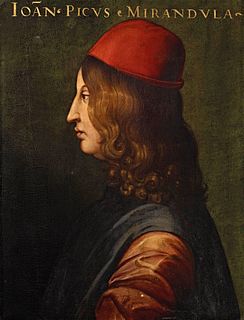Top 16 Quotes & Sayings by Giovanni Pico della Mirandola
Explore popular quotes and sayings by an Italian writer Giovanni Pico della Mirandola.
Last updated on December 18, 2024.
A sacred pride should grip us of not being satisfied with the mediocre but to strive (for we can do it, if we want to) with the exertion of all our strength to attain the highest. Let us scorn what is of this earth, let us ignore what is of heaven, let us leave absolutely everything worldly behind us in order to hasten to the abode out of this world, in the proximity of the sublime deity. We do not need to think of stepping back. Of being satisfied with second rank, let us strive for dignity and glory. To attain the highest.






















